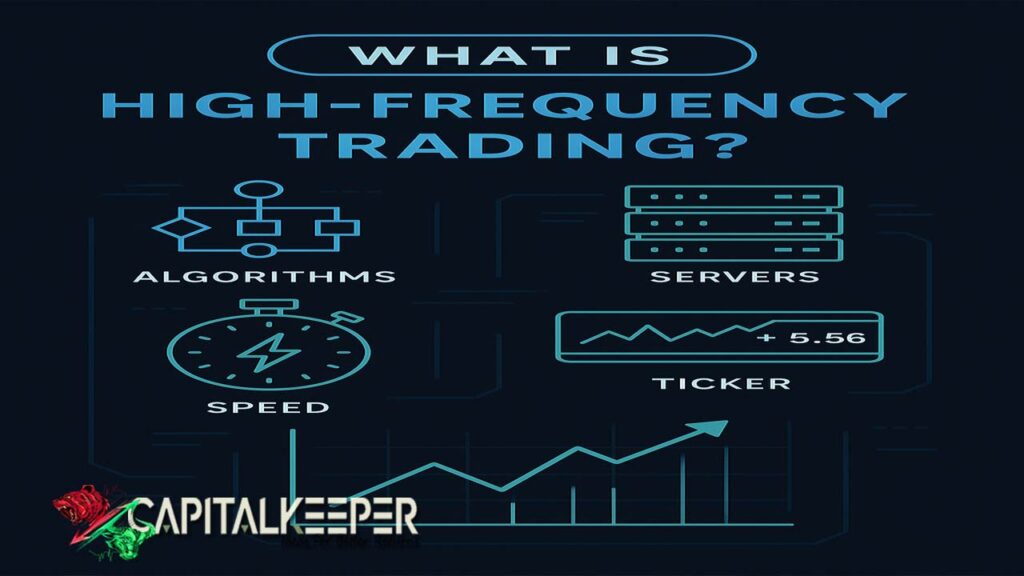What is High-Frequency Trading (HFT)? A Beginner’s Guide to Algo Trading – 21 June 2025
By CapitalKeeper | Beginner’s Guide | Indian Sock Market | Market Moves That Matter
High-Frequency Trading, or HFT, often evokes images of supercomputers, lightning-fast algorithms, and Wall Street wizards. But what really is HFT? Why does it matter? And how does it impact everyday investors like you?
This blog dives into the world of HFT — explaining the concept, its technology, pros and cons, and its growing role in the Indian and global markets.
🧠 What is High-Frequency Trading?
High-Frequency Trading (HFT) is a form of algorithmic trading that uses powerful computers and complex mathematical models to execute thousands of orders in milliseconds or microseconds.
Key Characteristics:
- Speed: Trades are executed in microseconds (1 millionth of a second).
- Volume: Large number of trades, often in small quantities.
- Short Holding Period: Positions are held for seconds or less.
- Algorithm Driven: No human decision-making; fully automated.
🖥️ How Does It Work?
At the core, HFT involves:
- Algorithmic Models – Programs that spot price inefficiencies or arbitrage opportunities.
- Co-location – Placing servers physically close to stock exchange data centers to reduce latency.
- Market Data Feeds – Consuming Level 1 and Level 2 data to analyze order books.
- Execution Logic – Algorithms that place, cancel, or modify orders in real time.
Think of it like Formula 1 racing in the financial markets — milliseconds matter, and the best “machines” win.
📈 What Strategies Do HFT Firms Use?
| Strategy | Description |
|---|---|
| Market Making | Quoting buy and sell prices to profit from bid-ask spread. |
| Arbitrage | Exploiting price differences in the same stock on different exchanges. |
| Momentum Ignition | Initiating orders to start a price movement, then profiting from it. |
| Statistical Arbitrage | Complex modeling of price relations between securities. |
🌍 HFT in the Indian Market
🏛️ Regulatory Framework
- SEBI regulates HFT via its guidelines on algorithmic trading and co-location.
- Exchanges like NSE and BSE offer co-location services for low latency.
- Order-to-trade ratio, maximum order message limits, and randomization are in place to curb misuse.
🧾 Market Share (as of 2025):
- HFT accounts for 40–45% of daily volumes in Indian derivatives and ~25% in equities.
- Major players include institutional brokers, proprietary trading firms, and some global quant funds.
⚖️ Pros and Cons of HFT
✅ Benefits:
- Liquidity: Narrower bid-ask spreads help all market participants.
- Efficiency: Faster price discovery and arbitrage.
- Reduced Costs: High competition among traders improves execution prices.
❌ Concerns:
- Market Manipulation: Some strategies (e.g., spoofing) can mislead others.
- Flash Crashes: Sudden liquidity vacuum may trigger rapid price falls.
- Unfair Advantage: Retail investors cannot match the infrastructure or speed.
A famous example: The 2010 “Flash Crash” in the US wiped out $1 trillion in minutes — partially blamed on HFT algorithms misfiring.
🧮 HFT vs Traditional Trading
| Feature | High-Frequency Trading | Traditional Trading |
|---|---|---|
| Speed | Microseconds | Minutes to hours |
| Holding Period | Seconds or less | Days to years |
| Decision-Making | Fully algorithmic | Human or hybrid |
| Infrastructure Needed | Co-location, low-latency tech | Internet connection & broker |
| Trader Type | Institutions, hedge funds | Retail traders, investors |
🤖 Is HFT Good or Bad?
It’s a double-edged sword. HFT brings efficiency and liquidity, but also raises ethical and regulatory questions.
Retail investors aren’t directly harmed, but may find themselves disadvantaged in:
- Order execution speed
- Market access
- Transparency of price movements
SEBI’s continuous monitoring has reduced HFT-related abuse, but retail investors should still focus on longer-term strategies, stop-loss discipline, and not chasing trades based on volatility spikes.
🔮 The Future of HFT in India
- 📈 AI & Machine Learning: The next frontier for smarter trading algorithms.
- 🧪 Hybrid Strategies: Combining HFT with fundamental or quant investing.
- 📜 Stricter Regulation: More transparency and risk controls for fairness.
- 🌐 Retail Tech: Platforms may eventually offer retail algo solutions (in sandbox environments).
📌 Final Thoughts
High-Frequency Trading is a technological marvel — reshaping markets at blazing speed. While it’s not something the average investor needs to mimic, understanding its role helps in navigating markets with clarity and caution.
Stay informed, stay focused, and let HFT work in your favor — not against your portfolio.
📌 For more real-time updates, trade setups, and investment insights — follow us on [Telegram] and subscribe to our newsletter!
📌 Disclaimer
The content provided on CapitalKeeper.in is for informational and educational purposes only and does not constitute investment, trading, or financial advice. While we strive to present accurate and up-to-date market data and analysis, we make no warranties or representations regarding the completeness, reliability, or accuracy of the information.
Stock market investments are subject to market risks, and readers/investors are advised to conduct their own due diligence or consult a SEBI-registered financial advisor before making any investment decisions. CapitalKeeper and its authors are not liable for any loss or damage, direct or indirect, arising from the use of this information.
All views and opinions expressed are personal and do not reflect the official policy or position of any agency or organization. Past performance is not indicative of future results.
By using this website, you agree to the terms of this disclaimer.
CapitalKeeper | Turning Market Noise into Market Wisdom
🔗 Visit CapitalKeeper.in

